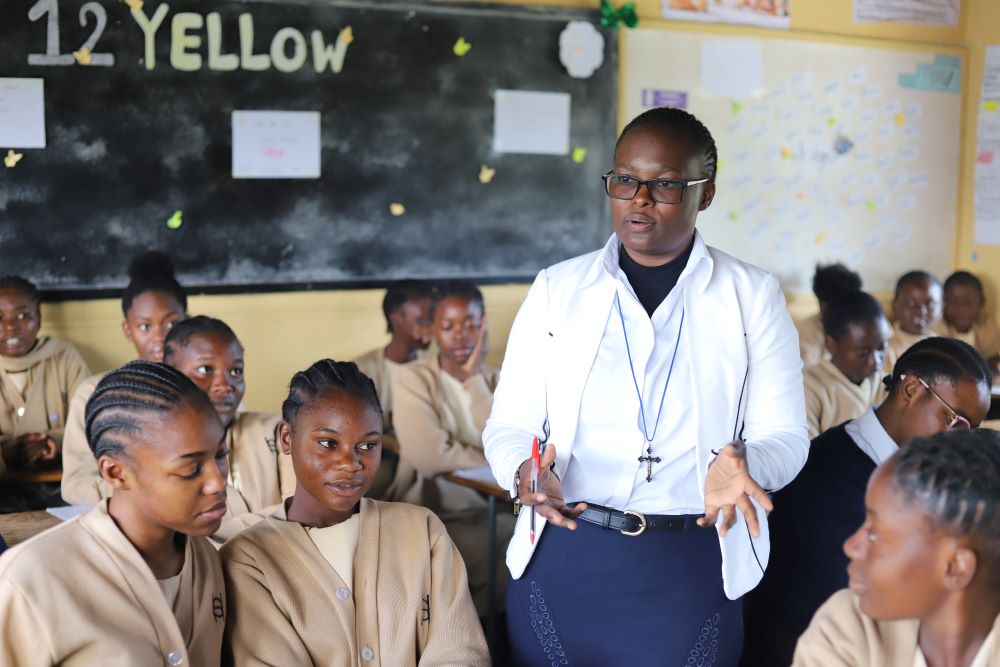
Sr. Angela Ngwenyufu, a member of the Handmaids of the Blessed Virgin Mary, interacts with her students at St. Patrick's Secondary Girls School in Lusaka, Zambia, on May 25. Through ASEC's Higher Education for Sisters in Africa program, Ngwenyufu earned a degree in education. (GSR photo/Doreen Ajiambo)
Global Sisters Report celebrated its 10th anniversary in 2024 by bringing to readers updated versions of some of those first reported stories in 2014, as well as two powerful series, "Welcoming the Stranger" and "Evolving Religious Life."
Here are 10 noteworthy series or stories that we hope you will take time to read again, or share with others. In return, we will continue to be a source of inspiration, peace and hope by telling the stories of women religious worldwide.
With specially commissioned columns and updates on stories and columns published in 2014, GSR launched its 10-year anniversary series in April.
"It has been a great joy for me to work with sister-writers these past 10 years since Global Sisters Report was launched," wrote Presentation Sr. Joyce Meyer, GSR's international liaison. "Through their columns and stories, new voices of sisters from around the world are heard every day. The silence that has often shrouded them is broken through and they become visible in new ways."
The first of our two overarching series this year, "Welcoming the Stranger" takes a closer look at women religious working with immigrants and migrants. Our hope for this series was not only to feature sisters and organizations serving those crossing the U.S. border, but also to demonstrate that migration is a phenomenon that countries all over the globe are experiencing, with reports from Jerusalem, Montreal and Brazil.
The series culminates with a story about sisters and Catholic groups organizing support for undocumented immigrants living in uncertainty following U.S. President-elect Donald Trump's promise of mass deportations.
With more than a dozen columns and articles, "Evolving Religious Life" explores how Catholic sisters are adapting to the realities of congregations in transition and new forms of religious life.
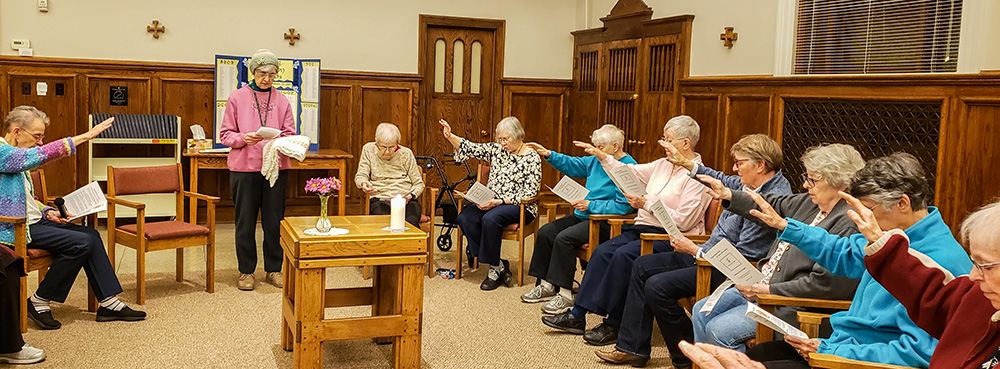
The Notre Dame SIsters of Omaha, Nebraska, pray for Sr. Theresa Maly (third from left) at her prayer shawl ceremony, held when a sister transitions to a care facility. She is presented with a shawl that symbolizes the community's love and prayers for her. (Courtesy of the Notre Dame Sisters of Omaha)
GSR often writes about these trends, but this particular series focuses more closely on sisters' hopes for the future. In December, national correspondent Dan Stockman interviewed several sisters whose communities are on the path to completion.
"For some communities, coming to completion is the right decision — after all, it is called religious life, and we don't want women and men to enter communities without life," said Sr. Debbie Borneman, a member of the Sisters of Sts. Cyril and Methodius. "We do need to resize our properties and simplify our belongings. But sometimes we get so preoccupied planning for the emerging future we can forget the urgent needs of our world."
This series will be ongoing, so keep an eye out for future stories and columns.
Wednesdays are for the wisdom of women religious
In February, GSR announced "Wisdom Wednesday," a new video series to highlight the pieces of wisdom that are passed on in religious life — wisdom that we hope would move our readers (sisters or otherwise), too.
"When I have asked sisters about a piece of wisdom that they have received in religious life and that still sustains them, I was always so touched by the responses," wrote GSR columns editor Sr. Helga Leija in describing the series. "These words of wisdom by sisters have nurtured me over the years with the challenges and changes I've encountered in religious life. I've clung to them, replayed them in my mind and used them to guide me in a life that, 20 years later, I still love."
Advertisement
ASEC uplifts 'entire communities' in Africa in 25 years of educating sisters
GSR international correspondent Chris Herlinger and Africa/Middle East correspondent Doreen Ajiambo collaborated on this story about the 25th anniversary of the African Sisters Education Collaborative (ASEC), based on the campus of Marywood University, a Catholic school in Scranton, Pennsylvania.
The program's mission is to address the lack of education among African religious sisters and non-African sisters working on the continent. The program "filled a gap and addressed an issue that no other organization dared to — supporting the education of sisters in Africa," said former ASEC director Sr. Jane Wakahiu, a member of the Institute of the Little Sisters of St. Francis.
The Catholic social justice lobby Network brought back its vaunted Nuns on the Bus tour: the eighth one since it began in 2012 and the first in-person tour since 2018, after the 2020 tour was held virtually because of the coronavirus pandemic.

The bus for the Nuns on the Bus & Friends tour, organized by NETWORK Advocates for Catholic Social Justice, is seen at its Las Vegas stop Oct. 14. (Alecia Westmorland)
GSR followed the group throughout its tour in 20 cities, beginning in Philadelphia on Sept. 30 and ending almost three weeks later in San Francisco on Oct. 18 with speakers imploring voters to choose the freedom and democracy needed for everyone in America to thrive.
From clericalism to communion: The church's never-ending conversion
Following the first session of the synod on synodality, where women "expressed deep gratitude for the work of priests and bishops," but also noted that clericalism continues to "scar the face of the Church and damage its communion," GSR asked The Life panelists: What is the spiritual conversion needed in order for healing to take place?
"If we envision a synodal church that focuses on communion, mission and participation, spiritual conversion is crucial," wrote Sr. Mary Karuna Matthew, a native of India who is affiliated with the Congregation of the Sisters of Notre Dame of Coesfeld, Germany. "To bring healing to the wounded church, we need to be inclusive, listening with heart, and dialoguing with respect. A movement from an egocentric and narcissistic attitude to a compassionate and empathetic attitude is vital."
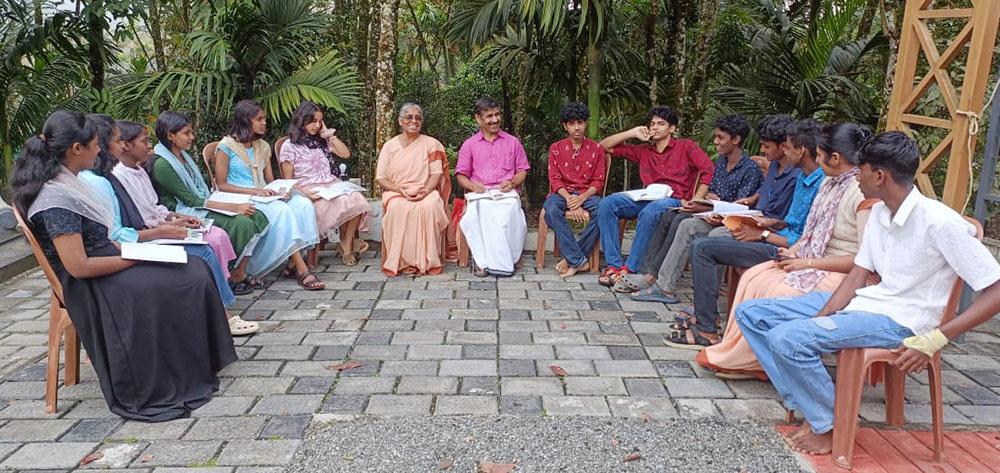
Sisters of Notre Dame from Thrikkaipetta, Kerala, India, engaged in dialogue with the parishioners of St. George Church in the spirit of synodality. (Mary Karuna Matthew)
Indigenous vocations flourish in Guatemala's remote highlands
In the mountains of Guatemala, roughly 50 Indigenous nuns of the Missionary Sisters of the Eucharist assist fellow Indigenous communities through education, spirituality and care for those most in need.
The sisters have a garden of plants and herbs they use for medicinal purposes.
"We have to have that knowledge of medicinal plants because we go to very distant areas where you can't get a doctor. So, [we figure out] how to help those who are sick whom we find in our pastoral work," Sr. Marta Yach Cosme explained.
Forced into scamming, trafficking survivors in Zambia recover with sisters' help
After applying for a job teaching English in Thailand, Angela was forced into one of the fastest-growing types of scams in the world: the pig butchering scam, where scammers trick people into investing in cryptocurrency platforms after building trust through digital relationships.
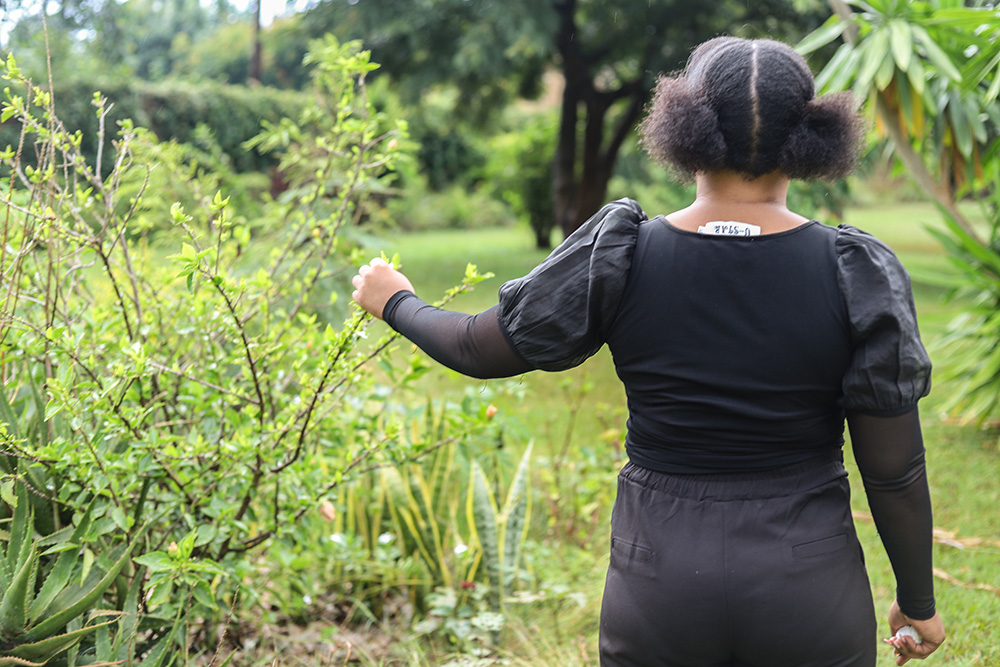
Angela (name changed) was forced to scam people online after she was trafficked to Thailand. She now receives training in catering at a local college in Lusaka, Zambia, after her return. Her training is sponsored by Catholic leaders working to end human trafficking in the country. (GSR photo/Doreen Ajiambo)
Surprisingly, some scammers, like Angela, are victims of human trafficking themselves. They often deceive people with promises of real jobs and then coerce them into scam operations using threats of violence.
After returning to Zambia, Angela endured severe mental health issues, including post-traumatic stress disorder. Her church members introduced her to the religious sisters who operate Talitha Kum Zambia, or TAKUZA, an organization that aims to end human trafficking in Zambia.
This month, in recognition of National Slavery & Human Trafficking Prevention Month, GSR will be looking back at some of our best reported stories on trafficking awareness, along with publishing new Q&As with sisters working in this ministry.
Mercy Sr. Theresa Kane, prominent advocate for women's rights, dies at 87
Mercy Sr. Theresa Kane, who fought for decades for the equality of women in the Catholic Church — famously publicly challenging the pope on the issue in 1979 — died Aug. 22. She was 87.
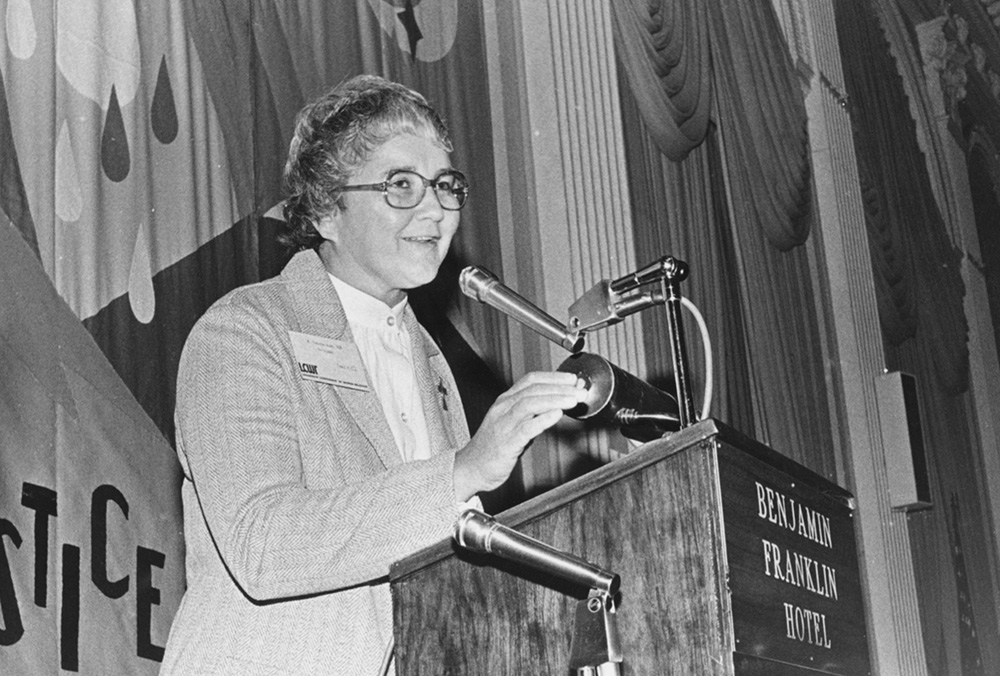
Mercy Sr. Theresa Kane, then president of the Leadership Conference of Women Religious, addresses the organization's assembly in Philadelphia in August 1980. (NCR photo/Mary Bader Papa)
Kane served for seven years in leadership of what was then the New York Province of the Sisters of Mercy, before being elected in 1977 as president of the Religious Sisters of Mercy of the Union. The next year, in 1978, she became president of the Leadership Conference of Women Religious (LCWR).
That position gave her the honor of what would become Kane's signature public moment: greeting Pope St. John Paul II during his visit to the United States in 1979. During her remarks, which were televised and before an audience of 5,000 sisters, Kane told the pope, "The church, in its struggle to be faithful to its call for reverence and charity for all persons, must respond by providing the possibility of women as persons being included in all the ministries of our church."
Bonus series: La Vida
In May, GSR en español announced the first La Vida panel, the Spanish version of The Life. In the first question, panelists were asked: How can living authentically attract others to religious life?








